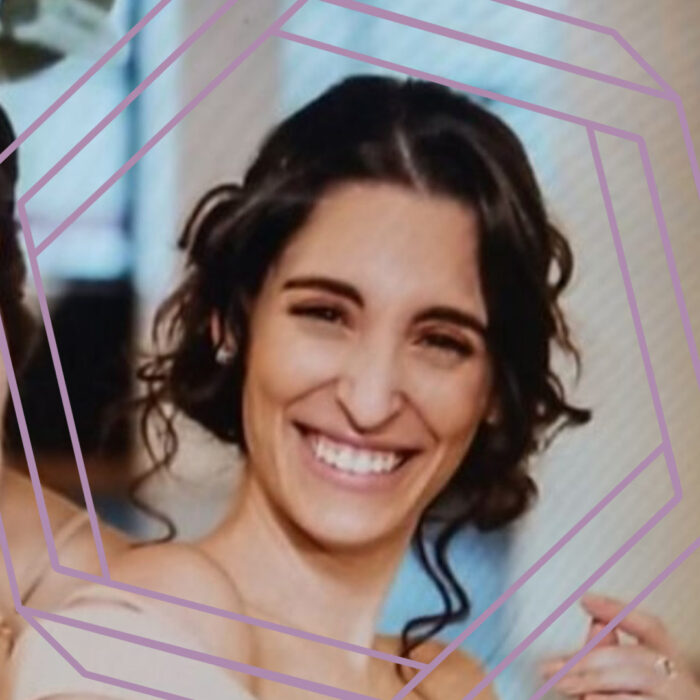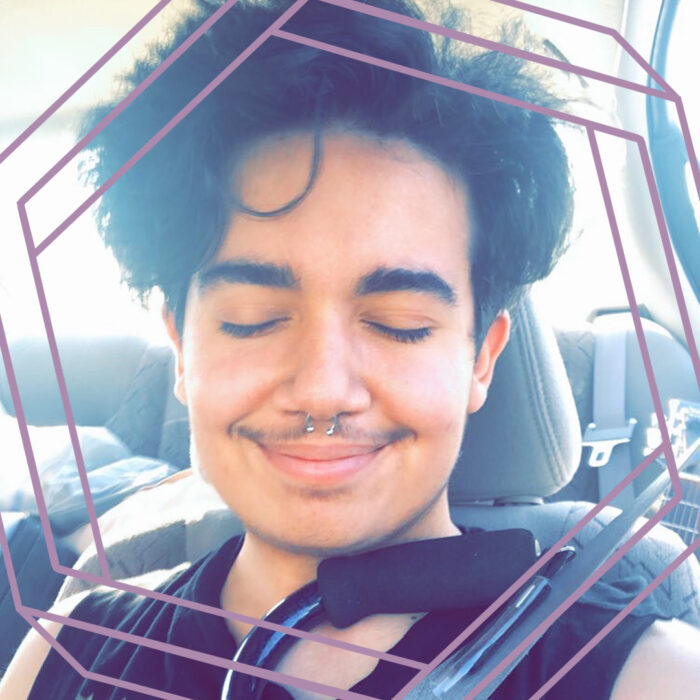69 – Adriana
Description
 </figure>
</figure>Adriana E. talks Ehlers-Danlos Syndrome, finding a new balance after diagnosis, and unpacking your own internalized ableism.
Transcript
I’m Brianne Benness and this is No End In Sight, a podcast about life with chronic illness.
Quick update before we get started: This is the last of the interviews that I recorded in 2019. I’m really excited to finally be getting it out there, and I’m also excited that this means that work really is underway on our next batch of episodes. I’m so grateful to the folks who have signed up to financially support the show at patreon.com/noendinsight, and this week I want to thank Wingspan Health for sponsoring the episode transcript.
So far, I’ve recorded five new stories and I’ve hired Drew Maar, who you might know as @fibrofuckboy on twitter, as a new associate producer to get things running more smoothly. You’ll be learning lots more about Drew over the next couple episodes, so for now let’s travel back to the fall of 2019 when today’s story was recorded.
Today I’m talking to Adriana E about Ehlers-Danlos Syndrome, finding a new balance after diagnosis, and unpacking your own internalized ableism.
Before we start, here’s my disclaimer:
This podcast is not intended as a substitute for professional medical advice, diagnosis or treatment. Make sure you talk to your practitioner about any questions or symptoms.
[guitar riff]
Brianne: Well, I like to get started just by asking people, how was your health as a kid?
Adriana: Alright. So that’s kind of a difficult question because I thought it was normal up until I got my diagnosis and then I started thinking back, and I’m sure I can’t remember everything, but it explains a lot of things. I was delayed in standing and walking. I also was really physically just slow.
Everyone thought I was just lazy, and my nickname when I was growing up was Eeyore.
Brianne: Oh, no.
Adriana: Yeah. All my teachers even called me that. It was like, you know, “This
is their cute name for me, I guess.”
Yeah. And then, I could always do random things like, bend things weird… like party tricks is kind of what we call it. And then, the last one would be that I always had pain, and I was always told that it was just growing pains. And it wasn’t until recently that I was like, “Wait, that’s not possible when you’re in your twenties.”
Brianne: Yeah. Yeah. You stopped growing. And so that one’s a really interesting one to
me, partly… so I had growing pains that were growing pains, and I didn’t realize that it was such a common thing that doctors say to people who turn out not to be having growing pains. So what was that pain like?
How did it feel?
Adriana: So I think it felt actually like growing pains, cause they were just random, everywhere, but I think they were more intense because of my condition. It kind of might’ve made it more difficult, so things were stretching and you know, being…
or contracting or just doing weird things… joints being weird.
So I think it was more that it happened more frequently with me, but they kept brushing it off. So at one point I just didn’t even complain about it anymore, and it wasn’t ever severe. It’s just like… yeah.
Brianne: Yeah,
just uncomfortable. Okay. So, some discomfort and flexibility obviously, and then fatigue. And that was just how your body was. And I think… this comes up all the time too. I feel like as kids, we don’t really know how other people’s bodies feel, so unless it’s something that is obviously an acute crisis, there’s no reason to even think that something weird is going on.
Okay. So was there a moment for you when things started to change?
Adriana: Kind of. I always… my health was always just inconvenient. I always was going to the doctor for things that I had… I have hypothyroidism and then I have anemia that comes back that I always have to treat. So I always thought something was up with my health, but they were so minor, and
unrelated-seeming that I just brushed them off. But then it… my health took a dramatic turn. When I… two years ago, no, a year and a half ago, where I just… everything started going wrong. All systems.
Brianne: Okay, all at once.
Adriana: All systems failure. Yeah. All at once. It was one by one, but it was super quick, just dramatic decline in health.
So, it wasn’t until recently, but I think I always knew that something was gonna happen to me.
Brianne: Yeah. Yeah. There’s like a, “Oh, wait a minute. These things that have always been normal for me, it turns out aren’t normal for other people.”
And like, “Does that mean anything?”
Adriana: Yes.
Brianne: And so, just to back up for a sec, so you said you were hypothyroid and anemic, is that right?
Adriana: Yeah. So the overall, umbrella condition that I have is Ehlers-Danlos syndrome, but it comes with a lot of friends.
It comes with a lot of comorbidities. So they’re… some of them aren’t directly linked yet. They found some correlations, and there’s tons of studies still being done.
I say tons, but I really mean a few.
Brianne: Yeah,
well, like a big one came out… a big paper about Ehlers Danlos came out last night…
Adriana: Yeah they’re still working on it.
Brianne: …or something. I just saw things about it. That it’s much less rare than people have been saying for a long
time.
Adriana: It’s just not diagnosed, yeah. Because doctors don’t even really know about
it.
Brianne: Yeah.
Adriana: But yeah, it comes with a lot of comorbidities that get diagnosed on their own, and nobody really puts together the big picture.
So issues with my heart, just like… just random things that aren’t harmful really… things with my heart, they just kind of associated with hypothyroidism and brushed it off, and now they’re finding out that it’s actually a problem.
Brianne: Yeah. Okay. So it had been like… and also those are kind of easy ones, like thyroid problems in general and also anemia, so iron levels. They show up in standard blood tests.
Right?
So they’re things that people might pick up a lot earlier and like, “Oh, your thyroid, that explains all of your fatigue.
Oh, same with anemia, same with your iron levels.” Anyway. So you said a few years ago was when things really started to change. So what happened first?
Adriana: So it was about a year and a half ago and it’s kind of… there was kind of like a wrench that was thrown into my finding out what’s wrong with me. And that was my trip to Europe. So, things started after that. So I kind of attributed it to the trip. Like maybe I caught a virus or something, or
maybe just something was triggered from being over there. And so I didn’t really… I wasn’t really persistent, and it all started with swollen lymph nodes, just painless and, just annoying. They really were all over my neck and some of them in my face, but they weren’t huge and they weren’t… they didn’t feel anything like a tumor.
So my doctors were saying that too. “Oh, you just got back from Europe. So it’s probably a virus that you caught there.” Ehlers-Danlos syndrome is also not really… lymph nodes don’t really swell. I mean, maybe for the comorbidities, but for, in and of itself they don’t swell.
Brianne: Right. That’s not like a classic symptom or
something.
Adriana: Exactly. So that’s kind of a piece of the puzzle that really isn’t even solved.
We just don’t know why that happened, but, then it continued with… they actually started getting better, and then it continued to… I started having shortness of breath. And I think that was just because of my heart thing that’s going on. And then I was super fatigued, but it was like… it was just a bone tired, like all the time where I couldn’t even finish a day of work.
I had to go home early. I was just falling asleep, which is super rare for me. Cause I would work like 80 hours a week. I was putting my all into my job and having fun with it even too. So, I was…. it really brought up a red flag for me.
Brianne: Yeah. It’s drastic even if it’s hard to explain.
Adriana: Exactly. Yeah. But even my doctors at that point were still like, “No, it’s probably from your trip.”
And I wasn’t… I was starting to fight back, “But maybe it’s not!” You know?
Brianne: Yeah.
“That seems
strange, but I don’t have any other ideas.”
Adriana: Yeah. But of course they run a bunch of tests on me, and they come back fine. Maybe some mild issues that are just negligible to them or just things that can easily be explained by hypothyroidism.
Even though the levels were normal. They just wanted to blame it on that.
And then all kinds of things… I don’t know if they actually just started, but… or if I just sta








OMG, she's so beautiful.